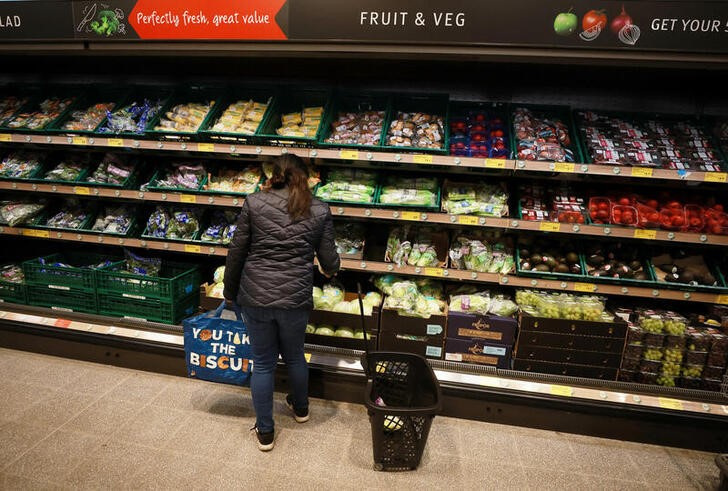By Andy Bruce and William Schomberg
LONDON (Reuters) -Worries about persistently high inflation in Britain grew on Wednesday as key measures of price growth monitored by the Bank of England failed to ease in July, despite a sharp drop in the headline inflation rate.
The annual consumer price inflation rate cooled to 6.8% from June's 7.9%, the Office for National Statistics said - as the central bank and a Reuters poll of economists had predicted and moving further away from October's peak of 11.1%.
The drop in the headline rate reflected falling energy prices and will be welcomed by British consumers who have faced higher inflation than in most other industrialised countries.
But fresh signs of stickiness in core inflation and consumer service prices echoed warnings by BoE policymakers this month that the risks of long-lasting high inflation were beginning to crystallise.
Core inflation, which excludes energy and food prices, remained at 6.9%, unchanged from June, and higher than expectations in the Reuters poll for a reading of 6.8%.
Services inflation, which mostly reflects home-grown inflation pressure from wages, rose to 7.4% from 7.2% - a little higher than the BoE had forecast.
Sterling rose slightly against the U.S. dollar on the back of the figures, which reinforced bets that the BoE will press on with its campaign of interest rate hikes.
The strength in core inflation is bad news for Prime Minister Rishi Sunak, who has promised to halve inflation by the end of the year - a goal that is now in question.
"With only four months to go, it no longer seems at all clear that inflation at the end of the year will have fallen by enough to achieve it," said Heidi Karjalainen, an economist at the Institute for Fiscal Studies, a think tank.
AMONG HIGHEST IN WESTERN EUROPE
The statistics office said falling gas and electricity prices were the biggest driver behind the drop in inflation, while food price inflation also eased.
Despite the drop in the headline figure, Britain still has one of the highest rates of price growth in Western Europe, with only Iceland and Austria suffering higher inflation of late.
"With wage growth and services inflation both stronger than the Bank had expected, it seems clear that the Bank has more work to do," said Ruth Gregory, economist at consultancy Capital Economics.
Figures published on Tuesday showed basic wages in Britain rose at a record pace in the three months to June, helping workers to recover some of their lost spending power but adding to the worries for the BoE.
Financial markets on Wednesday showed a roughly two-thirds chance that the BoE's Bank Rate will hit 6% in February, up from 5.25% now.
Petrol and diesel prices - down a record 25% on a year ago - were another big drag on inflation.
But there were painful increases for other goods and services. Sugar prices rose by 55%, while transport insurance costs were up 50%, the biggest rise since records started in the late 1980s.

The data are likely to herald an imminent return to wage growth in real terms, which has been negative since April last year, adjusted for CPI.
There were signs of a weakening of inflation pressure ahead from the manufacturing sector as factory gate prices fell by 0.8% in the 12 months to July, the weakest reading since October 2020. Manufacturers' input prices fell by 3.3%, the biggest fall since May 2020.
